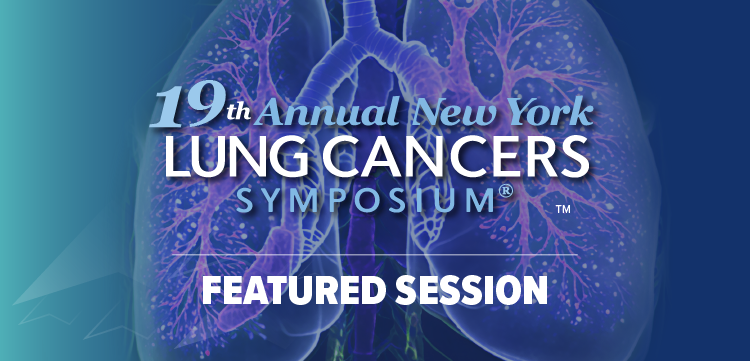
Lung Cancer
Latest News
Latest Videos

CME Content
More News

A supplemental biologics license application was submitted for telisotuzumab vedotin for the treatment of metastatic EGFR wild-type nonsquamous non–small cell lung cancer.

The FDA approved neoadjuvant nivolumab plus chemo, followed by adjuvant nivolumab for non-small cell lung cancer without EGFR mutations or ALK rearrangements.

The FDA approved osimertinib for locally advanced, unresectable stage III EGFR-mutated non-small cell lung cancer.

Belrestotug plus dostarlimab-gxly improved ORR in patients with previously untreated, unresectable, locally advanced or metastatic, PD-L1–high NSCLC.

Adagrasib outperformed docetaxel in patients with KRAS G12C-mutated non–small cell lung cancer, regardless of baseline brain metastases.

The FDA approved amivantamab-vmjw plus chemotherapy for locally advanced or metastatic non–small cell lung cancer (NSCLC) that harbors EGFR exon 19 deletions or exon 21 L858R substitution mutations whose disease has progressed on or after treatment with an EGFR TKI.

The FDA approved pembrolizumab plus pemetrexted and platinum chemotherapy for advanced or metastatic malignant pleural mesothelioma.

Zipalertinib was safe and effective for heavily pretreated patients NSCLC harboring EGFR exon 20 insertion mutations who progressed on or after amivantamab.

Amivantamab plus chemotherapy delivered promising OS trends compared with chemotherapy in EGFR-mutant advanced non-small cell lung cancer after disease progression on osimertinib.

While none of the experimental combinations met efficacy targets, durvalumab with monalizumab and ceralasertib showed promising long-term benefits in patients with advanced NSCLC.

Adding relatlimab to nivolumab and chemotherapy improved efficacy but did not increase safety concerns in advanced-stage lung cancer.

The addition of BMS-986012 to frontline nivolumab and chemotherapy led to promising outcomes in patients with extensive-stage small cell lung cancer.

Consolidation durvalumab improved survival across subgroups of patients with limited-stage small cell lung cancer based on factors associated with prior prophylactic cranial irradiation and concurrent chemoradiotherapy use.

Adjuvant durvalumab failed to improve disease-free survival in resected EGFR- or ALK-negative non-small cell lung cancer.

The agency approved the subcutaneous injection of atezolizumab and hyaluronidase-tqjs for all of the adult indications as the intravenous formulation of atezolizumab.

Merck has discontinued the KEYNOTE-867 and KEYNOTE-630 trials evaluating pembrolizumab in non-small cell lung cancer and cutaneous squamous cell carcinoma.

Throughout August, the FDA approved drugs for the treatment of diseases including non-small cell lung cancer, cutaneous T-cell lymphoma, astrocytoma/oligodendroglioma, and endometrial cancer.

Breakthrough therapy designation has been granted by the FDA to GSK5764227 for potential use in some patients with extensive-stage SCLC.

Higher corticosteroid peak dose may worse progression-free and overall survival in several tumor types including melanoma, non-small cell lung cancer, and others.

Fast track designation has been granted by the FDA to Deltacel with low-dose radiation for pretreated metastatic non–small cell lung cancer.

A behavioral intervention led by oncology nurses alleviated dyspnea in patients with advanced lung cancer, suggesting further research for long-term effects.

First-line amivantamab plus lazertinib has been approved by the FDA for locally advanced or metastatic EGFR-mutated non–small cell lung cancer.

Oncology nurses play a crucial role in educating patients about the significance of liquid biopsy in diagnosis and its use in evaluating resistance.

The KeyVibe-008 trial evaluating vibostolimab, pembrolizumab, and chemotherapy in extensive-stage small cell lung cancer has been discontinued.

Applying diversity, equity, and inclusion to cancer clinics can help oncology nurses and APPs make an impact on patient care and research.


























































































